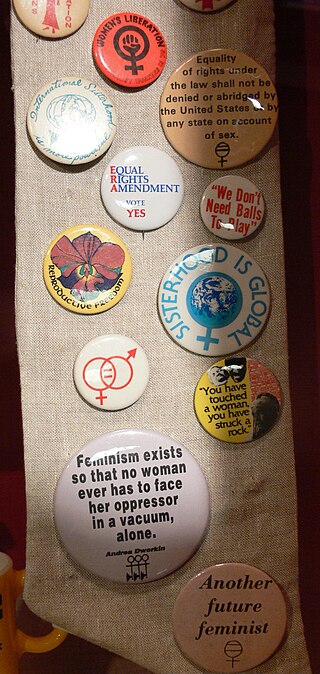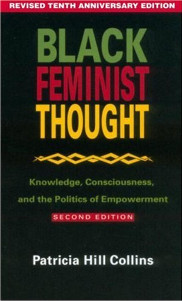Triple oppression, also called double jeopardy, Jane Crow, or triple exploitation, is a theory developed by black socialists in the United States, such as Claudia Jones. The theory states that a connection exists between various types of oppression, specifically classism, racism, and sexism. It hypothesizes that all three types of oppression need to be overcome at once.

Womanism is a term originating from the work of African American author Alice Walker in her 1983 book In Search of Our Mother's Garden, denoting a movement within feminism, primarily championed by Black feminists. Walker coined the term "womanist" in the short story Coming Apart in 1979. Her initial use of the term evolved to envelop a spectrum of issues and perspectives facing black women and others.
Feminist theory is the extension of feminism into theoretical, fictional, or philosophical discourse. It aims to understand the nature of gender inequality. It examines women's and men's social roles, experiences, interests, chores, and feminist politics in a variety of fields, such as anthropology and sociology, communication, media studies, psychoanalysis, political theory, home economics, literature, education, and philosophy.
The matrix of domination or matrix of oppression is a sociological paradigm that explains issues of oppression that deal with race, class, and gender, which, though recognized as different social classifications, are all interconnected. Other forms of classification, such as sexual orientation, religion, or age, apply to this theory as well. Patricia Hill Collins is credited with introducing the theory in her work entitled Black Feminist Thought: Knowledge, Consciousness, and the Politics of Empowerment. As the term implies, there are many different ways one might experience domination, facing many different challenges in which one obstacle, such as race, may overlap with other sociological features. Characteristics such as race, age, and sex, may intersectionally affect an individual in extremely different ways, in such simple cases as varying geography, socioeconomic status, or simply throughout time. Other scholars such as Kimberlé Crenshaw's Mapping the Margins: Intersectionality, Identity Politics, and Violence against Women of Color are credited with expanding Collins' work. The matrix of domination is a way for people to acknowledge their privileges in society. How one is able to interact, what social groups one is in, and the networks one establishes are all based on different interconnected classifications.

Intersectionality is a sociological analytical framework for understanding how groups' and individuals' social and political identities result in unique combinations of discrimination and privilege. Examples of these factors include gender, caste, sex, race, ethnicity, class, sexuality, religion, disability, height, age, weight and physical appearance. These intersecting and overlapping social identities may be both empowering and oppressing. However, little good-quality quantitative research has been done to support or undermine the practical uses of intersectionality.

Patricia Hill Collins is an American academic specializing in race, class, and gender. She is a distinguished university professor of sociology emerita at the University of Maryland, College Park. She is also the former head of the Department of African-American Studies at the University of Cincinnati. Collins was elected president of the American Sociological Association (ASA), and served in 2009 as the 100th president of the association – the first African-American woman to hold this position.

Afrocentricity is an academic theory and approach to scholarship that seeks to center the experiences and peoples of Africa and the African diaspora within their own historical, cultural, and sociological contexts. First developed as a systematized methodology by Molefi Kete Asante in 1980, he drew inspiration from a number of African and African diaspora intellectuals including Cheikh Anta Diop, George James, Harold Cruse, Ida B. Wells, Langston Hughes, Malcolm X, Marcus Garvey, and W. E. B. Du Bois. The Temple Circle, also known as the Temple School of Thought, Temple Circle of Afrocentricity, or Temple School of Afrocentricity, was an early group of Africologists during the late 1980s and early 1990s that helped to further develop Afrocentricity, which is based on concepts of agency, centeredness, location, and orientation.
Michele Faith Wallace is a black feminist author, cultural critic, and daughter of artist Faith Ringgold. She is best known for her 1979 book Black Macho and the Myth of the Superwoman. Wallace's writings on literature, art, film, and popular culture have been widely published and have made her a leader of African-American intellectuals. She is a Professor of English at the City College of New York and the Graduate Center of the City University of New York (CUNY).
Black feminism is a branch of feminism that focuses on the African-American woman's experiences and recognizes the intersectionality of racism and sexism. Black feminism philosophy centers on the idea that "Black women are inherently valuable, that [Black women's] liberation is a necessity not as an adjunct to somebody else's but because of our need as human persons for autonomy."
Standpoint feminism is a theory that feminist social science should be practiced from the standpoint of women or particular groups of women, as some scholars say that they are better equipped to understand some aspects of the world. A feminist or women's standpoint epistemology proposes to make women's experiences the point of departure, in addition to, and sometimes instead of men's.

Black Sexual Politics: African Americans, Gender and the New Racism by Patricia Hill Collins is a work of critical theory that discusses the way that race, class and gender intersect to affect the lives of African American men and women in many different ways, but with similar results. The book explores the way that new forms of racism can work to oppress black people, while filling them with messages of liberation.
The Combahee River Collective (CRC) was a Black feminist lesbian socialist organization active in Boston, Massachusetts from 1974 to 1980. The Collective argued that both the white feminist movement and the Civil Rights Movement were not addressing their particular needs as Black women and more specifically as Black lesbians. Racism was present in the mainstream feminist movement, while Delaney and Manditch-Prottas argue that much of the Civil Rights Movement had a sexist and homophobic reputation.

A variety of movements of feminist ideology have developed over the years. They vary in goals, strategies, and affiliations. They often overlap, and some feminists identify themselves with several branches of feminist thought.

Black Feminist Thought: Knowledge, Consciousness and the Politics of Empowerment is a 1990 book by Patricia Hill Collins.
Hip hop feminism is a sub-set of black feminism that centers on intersectional subject positions involving race and gender in a way that acknowledges the contradictions in being a black feminist, such as black women's enjoyment in hip hop music and culture, rather than simply focusing on the victimization of black women in hip hop culture due to interlocking systems of oppressions involving race, class, and gender.
Misogynoir is a term referring to the combined force of anti-Black racism and misogyny directed towards black women. The term was coined by black feminist writer Moya Bailey in 2008 to address misogyny directed toward black transgender and cisgender women in American visual and popular culture. The concept of misogynoir is grounded in the theory of intersectionality, which analyzes how various social identities such as race, gender, class, age, ability, and sexual orientation interrelate in systems of oppression.
Feminist activism in hip hop is a feminist movement based by hip hop artists. The activism movement involves doing work in graffiti, break dancing, and hip hop music. Hip hop has a history of being a genre that sexually objectifies and disrespects women ranging from the usage of video vixens to explicit rap lyrics. Within the subcultures of graffiti and breakdancing, sexism is more evident through the lack of representation of women participants. In a genre notorious for its sexualization of women, feminist groups and individual artists who identify as feminists have sought to change the perception and commodification of women in hip hop. This is also rooted in cultural implications of misogyny in rap music.

Sister Outsider: Essays and Speeches is a collection of essential essays and speeches written by Audre Lorde, a writer who focuses on the particulars of her identity: Black woman, lesbian, poet, activist, cancer survivor, mother, and feminist. This collection, now considered a classic volume of Lorde's most influential works of non-fiction prose, has had a groundbreaking impact in the development of contemporary feminist theories. In fifteen essays and speeches dating from 1976 to 1984, Lorde explores the complexities of intersectional identity, while explicitly drawing from her personal experiences of oppression to include sexism, heterosexism, racism, homophobia, classism, and ageism. The book examines a broad range of topics, including love, self-love, war, imperialism, police brutality, coalition building, violence against women, Black feminism, and movements towards equality that recognize and embrace differences as a vehicle for change. With meditative conscious reasoning, Lorde explores her misgivings for the widespread marginalization deeply-rooted in the United States' white patriarchal system, all the while, offering messages of hope. The essays in this landmark collection are extensively taught and have become a widespread area of academic analysis. Lorde's philosophical reasoning that recognizes oppressions as complex and interlocking designates her work as a significant contribution to critical social theory.
Multiracial feminist theory is promoted by women of color (WOC), including Black, Latina, Asian, Native American, and anti-racist white women. In 1996, Maxine Baca Zinn and Bonnie Thornton Dill wrote “Theorizing Difference from Multiracial Feminism," a piece emphasizing intersectionality and the application of intersectional analysis within feminist discourse.
Ratchet feminism emerged in the United States from hip hop culture in the early 2000s, largely as a critique of, and a response to, respectability politics. It is distinct from black feminism, womanism, and hip hop feminism. Ratchet feminism coopts the derogatory term (ratchet). Other terms used to describe this concept include ratchet womanism as used by Georgia Tech professor Joycelyn Wilson or ratchet radicalism used by Rutgers professor Brittney Cooper. Ratchet is an identity embraced by many millennials and Gen Z black women and girls. The idea of ratchetness as empowering, or of ratchet feminism, has been articulated by artists and celebrities like Nicki Minaj, City Girls, Amber Rose, and Junglepussy, scholars like Brittney Cooper and Mikki Kendall, and through events like Amber Rose's SlutWalk. Many view ratchet feminism as a form of female empowerment that doesn't adhere to respectability politics.








